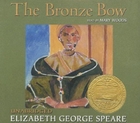The Bronze Bow by Elizabeth George Speare is a children's classic and Newbery medal winner set at the time of Christ's early ministry.
Daniel
has nothing but hatred for the Romans. They occupy his native land,
with soldiers everywhere, and Daniel feels that they are to blame for
his parents' death. Though he is only 15, Daniel considers himself a
zealot, has taken a vow to avenge his parents, and has run away from his
apprenticeship to a cruel blacksmith. He now makes his home in the
mountain caves with a band of thieves led by Rosh, a hard but
charismatic man who promises to lead the fight against the Roman
oppressors. When word comes to Daniel that his grandmother is dying, he
returns to the village where he grew up. He finds his grandmother at
death's door, and his sister Leah, who is mentally ill and refuses to
leave the house, in a pitiable state. Daniel longs to return to the
mountain, but when his grandmother dies, he is the only person who can
care for Leah. The old smith has died, and the new smith Simon, a friend
of Daniel's, has left his forge to follow a new teacher named Jesus
whose words are inspiring many in the area. Daniel occasionally goes to
hear this Jesus but finds his teachings confusing. Daniel is determined
to continue working for Rosh from his position in the village, and even
recruits Joel, a friend from the nearby city of Capernaum. Daniel also
gathers together a group of village boys who feel the same way he does
about the Romans. But when one of Rosh's plans results in Joel being
captured and Rosh does nothing to help, Daniel's faith in his leader is
shaken. And when Daniel's sister is taken ill with a fever, there is
only one person Daniel can turn to -- but will Jesus demand that Daniel
give up the one thing he's always clung to: his hatred of the Romans?
I found the pacing and characterization in this book very good, though
it is a product of its time and contains a few historical inaccuracies.
This book will be best appreciated by readers who approach it from a
Christian worldview, as it dovetails neatly with Biblical accounts of
Jesus' teachings in Galilee during the early part of his ministry. This
book is not without bias, and has been criticized for portraying some
aspects of Judaism harshly, so that's something some readers may want to
keep in mind. However, I actually found this much less problematic than
the last Speare book I read (The Sign of the Beaver).
As inspirational historical fiction, this book works pretty well -- and
since I believe the author originally wrote it for her Sunday School
class, that makes perfect sense. I doubt that it will appeal to a
broader audience, though.
The audio version was acceptable, but
not phenomenal. Having a female narrator (Mary Woods) is an unusual
choice for a book with a male main character, and though she did an
adequate job, I was never particularly impressed.
(Reviewed from an e-audiobook borrowed through my library system.)

This is almost impossible to get children to read at my school. Now I'm wondering about the historical accuracy of The Witch of Blackbird Pond!
ReplyDeleteI wondered that, myself. I think the difference between that and this, or that and Sign of the Beaver, is that the history in The Witch of Blackbird Pond is less fraught with controversy. As for the difficulty in getting kids to read it, I have yet to see an edition with a really appealing cover.
Delete